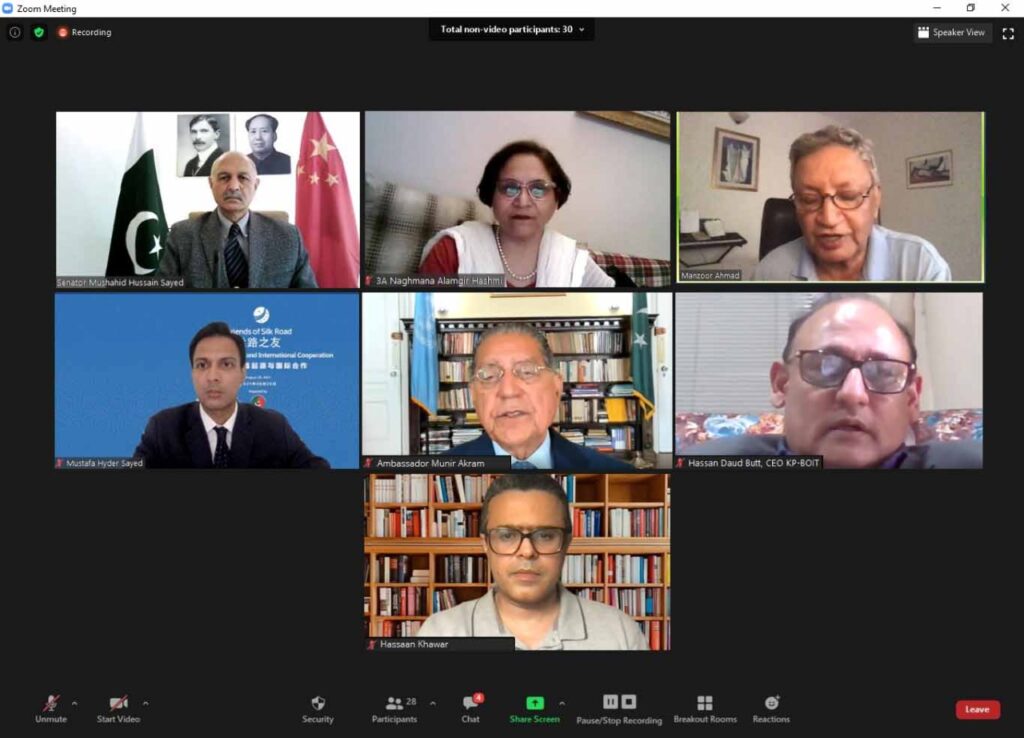PCI holds webinar on origins of Coronavirus

Islamabad: Pakistan-China Institute (PCI) Thursday organised a first-of-it’s-kind Webinar on “COVID-19 Origin and International Cooperation” under its flagship event series, “Friends of Silk Road (FOSR)”.
The webinar examined various reports and analyses about the origins of the Coronavirus Pandemic. The Webinar was attended by over 50 participants online, including different countries of Asia & Africa, and featured six panelists, including Ambassador to United Nations, Munir Akram, Naghmana Hashmi, former Ambassador to China, Senator Mushahid Hussain, Chairman of Senate Defence Committee, Hasaan Khawar, public policy expert, Hassan Daud Butt, CEO of KP Board of Investment and Trade, and Dr Manzoor Ahmed, former Ambassador to WTO. This dialogue was moderated by Mustafa Hyder Sayed, Executive Director of Pakistan-China Institute.
The Webinar discussed the report of the 17 US intelligence agencies, presented to President Biden on August 24, which remains “inconclusive” regarding the origins of the Coronavirus Pandemic. This follows the March 13 Joint Report of experts from WHO and China, comprising almost 20 experts from over a dozen countries, which said that it is “extremely unlikely” that the Coronavirus Pandemic was a leak from a lab.
Mustafa Hyder Sayed, Executive Director of PCI, highlighted how politicization of the pandemic is replacing multilateral cooperation in the fight against the Pandemic. He said ‘Playing politics with the pandemics detracts developing countries like Pakistan from effectively fighting it’. He also apprised the audience “if it weren’t for China in ensuring the donation of vaccines, almost 3.5 million doses, we would not have been able to save so many lives of Pakistanis.”
Ambassador Munir Akram, Permanent Representative of Pakistan to the UN, called the politicization of tracing the origins of the virus, a ‘regrettable move’, and said the efforts have been tainted by ‘conspiracy theories and smear campaigns.’ He also said that this has set a wrong precedent by exploiting the WHO as a ‘tool for political maneuvering’. Talking about the close cooperation of China with WHO to trace the origins of the virus, Ambassador Akram advised that the only way forward out of this misinformation epidemic is through, “science, as origin tracing is science, trust science, stay away from prejudice and politics.”
Hassan Khawar, public policy expert, highlighted how the coronavirus pandemic has taken more than 4 million lives so far, while continuing to wreak havoc throughout the world. He said that despite efforts to find the origins of the virus during the last almost two years, there is no scientific evidence to blame China. While talking about the way forward, Khawar said, “We need all countries to come together for research, and only then will we be able to find the origins of the virus.”
Ambassador Naghmana Hashmi, former Ambassador of Pakistan to China during the onset of the pandemic, called Covid-19 a ‘politically-charged virus’ that has increased global competition, and created two blocs in international system; one which alleges the virus was created in a lab in Wuhan, whereas the other thinks that it was created in a lab in Maryland, US. Ambassador Naghmana Hashmi also shed light on how the virus started an international debate on capitalism versus ‘socialism with Chinese characteristics’ to see which system was better. Using examples, she said China was efficient to put in place services and equipment that was required, while keeping its economy afloat, and helping other countries like Pakistan. She went on to say that the real ‘victims of politicization of the virus’ are the Third World countries, and this politics has wasted a lot of precious time in developing a global regime for vaccination.
Senator Mushahid Hussain quoted the August 24 report by 17 US’ intelligence agencies which failed to trace the origins of the coronavirus or lay blame on China. Senator Hussain said that despite this, China is demonized through a politically-motivated campaign. He mentioned how President Trump coined the term ‘China virus’, and said such ethnic targeting is similar to racism, Islamophobia and anti-Semitism. He uncovered the prevailing Cold-War mentality among some in the US, which has tried to link the virus to Asians, , “causing a spike of 169% in hate crimes against Asian- Americans.” While talking about the future, Senator Hussain said that the West needs to adopt China’s approach for equitable distribution of vaccines as a “global public good”, and halting vaccine nationalism through a “Vaccines Without Borders” Initiative plus reset of priorities, focusing on Health, Population Planning, Climate Change, Food Security and Water Security. This webinar lasted for 2 hours, with an animated 45 minute Q & A session.





